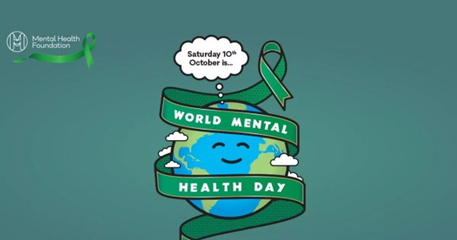Welcome to World Mental Health Day. The theme for this year is ‘It’s time to prioritise mental health in the workplace’. The World Federation for Mental Health says “Employed adults spend more time working than any other activity during their waking hours. In a myriad of ways, and at its best, work can provide a livelihood and be a source of meaning, purpose, and joy. However, for too many people, work falls far short of its potential, failing to enhance our lives and detracting from our mental health and well-being in ways that result in excessive distress and mental ill health”.
In our experience as therapists, we work with many individuals and in some workplace groups where we see individuals experiencing burnout such as in the education, health/social care and emergency services sectors. Workplace burnout is a type of stress linked to work. It includes being worn out physically or emotionally and may involve feeling useless, powerless and empty. Our life experiences, upbringing and environment can also play a part in whether we are prone to stress and how we manage stress.
Whatever the cause, job burnout can affect your physical and mental health. Consider these questions:
- Do you question the value of your work?
- Do you drag yourself to work and have trouble getting started?
- Do you feel removed from your work and the people you work with?
- Have you lost patience with co-workers, customers or clients?
- Do you lack the energy to do your job well?
- Is it hard to focus on your job?
- Do you feel little satisfaction from what you get done?
- Do you feel let down by your job?
- Do you doubt your skills and abilities?
- Are you using food, drugs or alcohol to feel better or to numb how you feel?
- Have your sleep habits changed?
- Do you have headaches, stomach or bowel problems, or other physical complaints with no identified medical cause?
If you answered yes to any of these questions, you might have job burnout.
If you’re experiencing stress in the workplace, you may notice changes in the ways you work, because of the way your thoughts and feelings affect you. These changes can make it harder to be productive which can negatively impact your behaviour and quality of work.
Common emotional changes include:
- feeling withdrawn, losing your drive and motivation
- decreasing self confidence
- intense emotional reactions – for example, being more tearful, sensitive or aggressive
Common changes to our thinking patterns include:
- jumping to conclusions without considering the facts
- minimising successes due to our focus on any challenges
- maximising problems, making them feel much bigger than they are
- jumping to the worst-case scenario
- holding yourself accountable or responsible for negative outcomes
- turning a positive into a negative
Common behaviour changes:
- avoiding certain tasks
- working longer hours
- working through holidays
- taking extra time off work
Signs and symptoms of work-related stress
Work related stress or issues in other aspects of our lives i.e. relationships, may arise if the following areas are not managed well:
- Lack of control of our workload – not having a say in how you do your job, such as your schedule, assignments or workload or not having what you need to do your work.
- Lack of clarity about what’s expected of you or responsibilities – If you’re not sure what your boss or others want from you, you’re not likely to feel like you’re doing a good job.
- Difficult relationships with colleagues or conflicts with others – maybe you work with an office bully, or you feel that colleagues are against you, or your boss is too involved with your work. Are you experiencing any harassment in the workplace?
- Poor line management and lack of support.
- Workplace discrimination
- Fear of redundancy or structural changes in the organisation
- High demands on our time & energy or too much or too little to do – maybe your job is boring or it’s so busy you can’t keep up with the demands. In these situations, you need a lot of energy to stay focused, which can lead to fatigue and job burnout.
- Lack of support – if you feel alone at work and in your personal life, you might feel more stressed.
- Problems with work-life balance – maybe your work takes up so much of your time and energy that you have nothing left for family and friends.
Doing nothing about job burnout can make the problems worse. As a result, you might feel drained, struggle to cope, difficulties with sleep, become sad, angry, irritable or not care. May use more alcohol or other substances or get high blood pressure, heart disease or type 2 diabetes and you’re more likely to get ill.
Work out what you find stressful
Try to identify what’s making you feel stressed. Do you find there’s not enough time in the day or that you have been given too many responsibilities? Or are there many changes happening with the possibility of redundancy? Maybe you find it difficult to manage some relationships with colleagues?
Focus on what you can change
Once you’re able to identify what’s making you feel overwhelmed, anxious or stressed at work you can figure out what your options are and what’s within your control to change.
Try to find ways of bringing some enjoyment to your working day. Could you go for walk before or after work, or during a break. Could you meet up with or contact a friend during a break?
If you’re worrying about things that are out of your control, like a restructure, merger or possible redundancy, then getting some advice on your options can help.
It can be helpful to look at ways to control how you cope with the stress:
- Look at your options – Talk to your boss about your concerns. Maybe you can work together to make changes or solve problems. Set realistic goals for what must get done. Find out what can wait. If things at work are not likely to change, you might look for a job that would be a better fit for you.
- Seek support – Ask co-workers, friends or loved ones for support. Talking to others might help you cope. Feeling like you belong protects against burnout. If your job offers an employee assistance program, look at the services offered. Mind has an online support community called Side by Side. You may work in a unionised environment where your trade union offers support.
- Try a relaxing activity – Look for activities that can help with stress. Examples are yoga, meditation or tai chi. Something as simple as taking some deep breaths a few times a day can help relieve tension.
- Get some exercise – Regular physical activity can help you cope with stress. It also can take your mind off work.
- Get some sleep – Sleep restores well-being and helps protect your health.
- Practice mindfulness – Mindfulness is being aware of what’s going on inside you and around you without judging or reacting. This practice can help you deal with what’s happening on the job.
Learn how to deal with stress in the moment
When we feel under pressure or anxious, our heart beats faster, our muscles tense up and our breathing changes.
Try to practice some relaxing breathing techniques which can help to bring your heart rate back to normal. Where you take 3 long, slow, deep breaths down to your stomach. Notice your stomach expanding, filling with air, and then returning to normal as you breathe out. You may wish to breathe in to a count of 4 and breathe out to a count of 4. Developing this to a longer out breathe
Build your resilience
Resilience is where we can bounce back from life’s struggles or challenges. Consider if there are any other areas of your life where you have successfully managed challenges.
Considering practical solutions to solve a problem can also help build resilience, i.e. shifting your perspective, reframing negative thoughts. Could you do something differently, or would it be worth waiting until tomorrow or next week to tackle a work situation?
Making a conscious effort to change the way you view an issue or feel about a problem at work could help ease some of the pressure you feel. For instance, if something at work is worrying you, is there a way to look at it that makes more sense? If you really cannot change it, is there a way you can at least accept it and find something you can learn from it?
A shift in mindset can also help if you’re having issues with relationships at work. It can help to remember that you never know what other people are dealing with, and approaching everyone with kindness goes a long way.
Focusing on the positives and feeling gratitude can help relieve stress. Each day, try listing 3 things that you could do that would make it a good day and/or things in your life you’re thankful for.
Set boundaries and switch off
When you’re feeling the pressure, setting clear boundaries to your day can help – this is particularly important if you work from home. Try to leave work worries at work and switch off in your free time.
How you start and end your day can make a big difference. If you tend to wake up just before you are due to start work or leave the house, you might find it helpful to give yourself time to get into work mode by waking up earlier.
Or if the first thing you do is reach for your phone to scroll, try to replace this habit with something else that you really enjoy, like reading a few pages of a book or a quick stretch to help you feel energised.
Look after your physical health
Our physical health has a big impact on how we feel. At times of stress, it can be easy to develop unhealthy habits, which can make you feel worse. Consider bringing movement into your working day as much as your job allows. Set yourself manageable goals, like adding just 5 more minutes of movement to your day. Go for a walk in your breaks and do simple stretches whenever you can.
Plan ahead and make healthy, well-balanced lunches that you’ll really enjoy eating. Remember to drink enough water, too.
The Wellness Consultancy can offer therapy support to individuals, groups or organisations directly or via an EAP (Employee Assistance Programme) Scheme. We have a helpful section on our website about different types of therapies and lots of self-help information Frequently Asked Questions – The Wellness Consultancy.
Helen Hyland
Child, Adolescent & Adult Integrative Psychotherapist, Tel 07894 212414
Further information, help and support for better mental health in the workplace
ACAS: workplace stress · Advice for staff, managers and business owners
https://www.acas.org.uk/managing-work-related-stress/understanding-the-law
GOV.UK: access to work https://www.gov.uk/access-to-work
Mind: how to be mentally healthy at work
Health & Safety Executive: Working Minds campaign https://workright.campaign.gov.uk/
NHS mental health hub has information and advice to help you
https://www.nhs.uk/mental-health
World Federation for Mental Health (wfmh.global)

